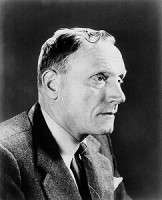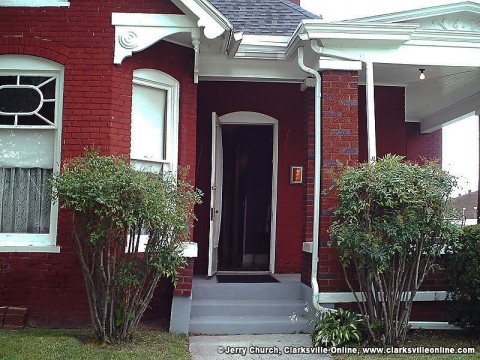
Clarksville, TN – One of the highlights of my year as a writer is attending the Robert Penn Warren Circle meetings in April. Here in one location are many of the true authorities on the life of one of the greatest writers our country has yet to witness.
These are the people who have devoted large portions of their lives to studying the work of Robert Penn Warren, the only person to date who has won three Pulitzer Prizes among scores of other awards for his more than 60 books and scores of other publications.
The Robert Penn Warren Circle meetings have moved to Clarksville now after having for years met part of the time at Western Kentucky University and then moving to Austin Peay State University and on to Guthrie, Kentucky for the Saturday luncheon and visit to the Robert Penn Warren Birthplace Museum.

I was late to the Saturday morning lecture on writing poetry by Greg Fraser and Chad Davidson authors of Writing Poetry: Creative and Critical Approaches (Palgrave Macmillan, 2009) because I could not miss the library book sale at the Montgomery County Library. I arrived at APSU just in time to hear an unforgettable story shared by Christopher Burawa, poet and director of The Center of Excellence for the Creative Arts.
Chris told us about a thoroughbred horse his uncle (who lived in Iceland as did Chris during his youth) had bought. An accomplished horseman, the uncle had believed he had acquired the horse at a bargain price until he began to try to ride it.
The beautiful horse, white star on his forehead, proved to like biting the rider more than obeying directions. After failing to conquer the stallion’s bad habits, the uncle hired a nationally-known trainer to get the horse to perform on command.
The trainer was seen reins in hand but standing in the saddle as the horse took off over a lava field; on their return the trainer was seated and seemed to be in control, but announced as he disembarked, “Shoot him!” The uncle complied and the family ate the horse for dinner!
Fraser and Davidson then used details from the story to weave into poetry and show the audience how other unrelated subjects could be toggled into the mix of the final results. They also presented Davidson’s book, From the Fire Hills, to everyone attending the presentation.
Following the lecture, we moved to the annual luncheon provided by the ladies of Guthrie. This is a highlight of the conference every year because the country ham biscuits, potato casserole, seasoned green beans, cool lime salad, pineapple salad, iced tea, coffee, and homemade pies are delectable and prepared by loving hands. The tables in the church reception hall this year featured bouquets of spring flowers surrounded by tiny soldiers and china animals and people to represent various works written by Robert Penn Warren.
Here is where some of the best conversations of the entire conference take place.On my right at lunch, William Bedford Clark is the primary editor of the RPW letters, a mammoth undertaking, and is one of the most down to earth professors in the country. Bedford shared with me stories about Joseph Blotner, Warren’s biographer (and the biographer of William Faulkner, the two-volume set a gift from Bedford’s wife for Christmas when they had been married only a couple of years).
He said that Joe had been captured during World War II and imprisoned, but that it had not embittered him. Bedford and Joe had been friends for years and they talked on the phone occasionally after Joe lived in assisted living as a result of osteoporosis near the end of his life. Bedford said that Joe had had a sad life after having outlived the deaths of many close to him.
On one call, Bedford was reminding Joe of how his great research and writing had enhanced the lives of so many others when Joe replied, “My boy!” Bedford was immensely touched by this description because he was well past 60 at the time.
I also gleaned from talking with Bedford that more than a dozen years ago he had written for the Sewanee Review an article called “Letters from Home” that discussed Warren’s complicated relationship with his parents, especially his mother. This article was based on letters that were nearly destroyed because they had been stored in a vacuum cleaner box in the basement of a college library.
Emma Cinina Brescia’s second husband had given her papers to the library where they were promptly shoved aside as being of little value. (Obviously, the librarian was unaware that she was Robert Penn Warren’s first wife!) Also found in the box were numerous books inscribed by the authors to Warren and Cinina!
On my left was another Warren scholar and treasurer of the RPW Circle, John Burt from Brandeis. Widely read, he related to the young scholars sitting across from us (one of whom is working on her Ph. D. At the University of Chicago with Warren’s daughter, Rosanna, as her thesis adviser) the origin of the term “Caucasian” as being a result of the study of skulls from various races by German anthropologist Johann Blumenbach.
The “white” skull came for the area of Russia, the Caucasus Mountains, between the Black and Caspian Seas, where women are rumored to be the most beautiful in all of Europe. As a result of this study, the man became enamored with the face he imagined and termed the white skull “Caucasian” and the entire race was thereafter termed as such. (Blumenbach did not give credit to philosopher Christoph Meiner, author of The Outline of History of Mankind (1785), who had previously used this term.)After lunch, I visited the Robert Penn Warren Birthplace Museum and located four of the volumes of RPW: An Annual of Robert Penn Warren Studies, a bargain at only $10.00 a copy. Bedford is also one of the editors of this journal. The fifth edition is a gold mine of information from his daughter, son Gabriel, and others who knew Warren himself.
Altogether, the day was a tremendous pleasure, a treasure of information, and a note to self to attend again every year of my life as long as I am physically and mentally able!


